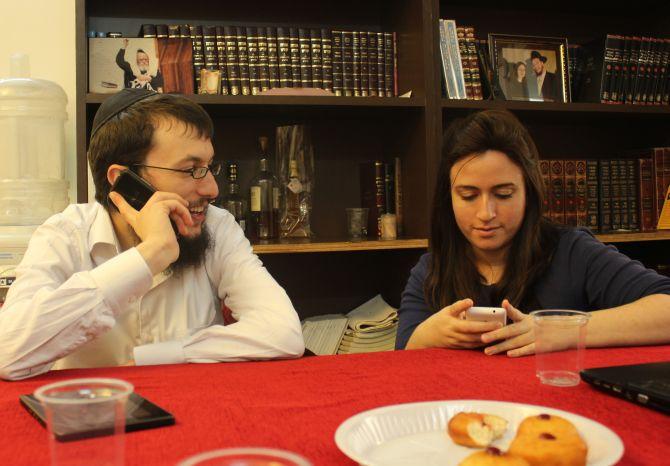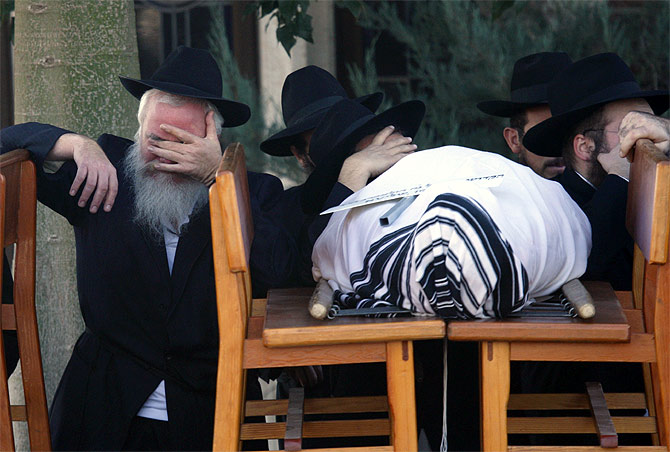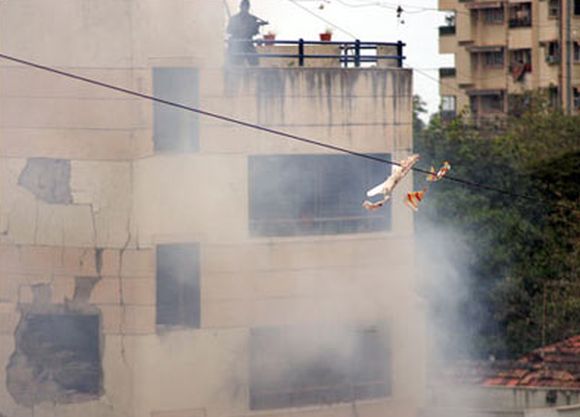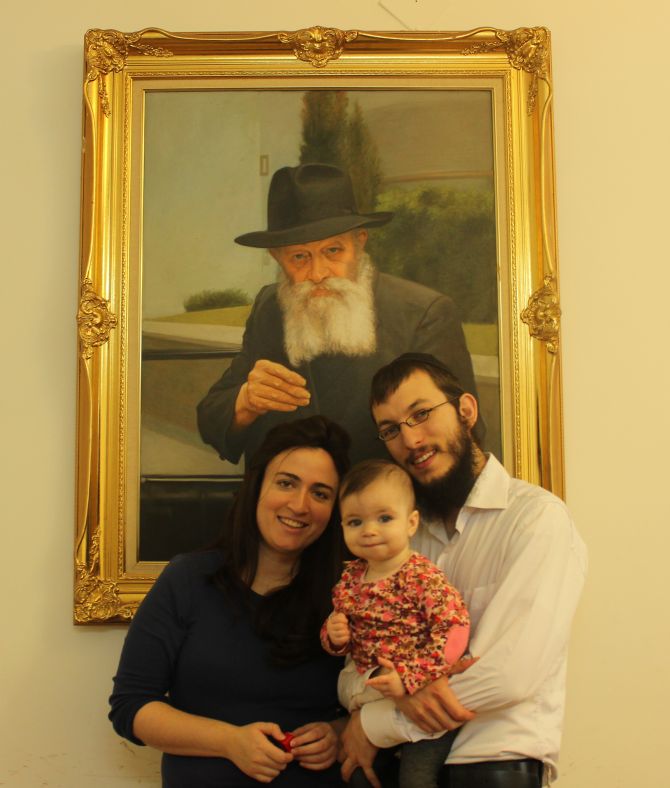 | « Back to article | Print this article |
Like Mumbai, the Jewish Chabad House moves on... cautiously
Once operating out of Nariman House in Colaba, the Jewish Chabad House has long since moved out and moved on since the night of November 26, 2008.
Even as it continues to remain an important centre for the Jewish community in the city, Chabad House embraces the post-26/11 India, with veils of secrecy and rings of security. Rediff.com's Abhishek Mande Bhot reports.
The Rabbi has a cold.
Occasionally, he excuses himself and reaches out to a crumpled tissue. For most part though, he is cheerful, replying to questions from a radio journalist, urging his listeners to perform good deeds "even if it is helping someone cross the road."
The rabbi is warm, welcoming and his sunny disposition is contagious.
Yet Rabbi Israel Kozlovsky is aware of the grim nature of the occasion he will preside over the next day, on November 26 as he conducts a memorial service at Nariman House.
The building had been home to the Chabad House (pronounced Habaad) till five years ago when terrorists stormed in, killing almost everyone present that night.
Since then, it has been abandoned only to come into prominence once every year during the anniversary. But far from the media's gaze, the building that has been under renovation will now be liveable again soon. In the coming months, its doors will be thrown open again.
Chabad House is a centre that promotes traditional Judaism. Besides hosting activities that bring the community together, Chabad House also serves as a lodging centre for travelling Jews.
Typically, a Chabad Rabbi and Rebbetzin run the Houses with help from young unmarried women or men and occasionally one or two other married couples.
Till 2008, Mumbai's Chabad House was run by Rivka and Gavriel Holtzberg. On the night of November 26, the couple was among those who were killed in the attack.
They had arrived in Mumbai a little over five years ago and had made Chabad House an important node for the city's Jewish community.
By all estimates, the Holtzbergs had become the parent figures they were supposed to be for the community. They presided over weddings, hosted meals during the Sabbath and opened the doors of Nariman House to travellers, rich and poor alike.
They had also assimilated well into Indian culture. Even though he would be clothed in the traditional white shirt and black hat, Gavriel had learnt Hindi. Neighbours remember the couple as being friendly, even though they didn't mingle a lot with outsiders.
Perhaps the Holtzberg's greatest achievement was the purchase of Nariman House, a prime property in Mumbai's tony Colaba area for $1.5 million.
The very building would become their grave.
Please click NEXT to read further...
'I don't think we can ever achieve what the Holtzbergs did'
When the subject of the Holtzbergs comes up, Rabbi Kozlovsky's wife Chhaya (pronounced Haaya) smiles wryly.
The rabbi recounts: "When we first arrived in Mumbai, everyone talked about the Holtzbergs. We felt like we were in competition (with them). Till one day we decided that the only way of successfully filling those large shoes is by not putting ourselves in those shoes. I don't think we can ever achieve what they did."
"They had a personal connection with every Jew that passed by Mumbai. So many people were good friends with them. They were so welcoming. (Can you imagine) buying a building in Colaba for a million-and-a-half dollars!?! He was 26 or 27 at the time, younger than me! (He raised the money himself because) in India a foreigner cannot take a loan. He has to come like James Bond with all the money."
"Everyone here had a personal connection with the Holtzbergs and they are expecting us to fill that hole. It is difficult."
The post 26/11 India makes it even more difficult for the Kozlovskys to reach out to the community.
"There are times when people -- Jews and non-Jews -- are afraid of visiting us," Kozlovsky says. "They tell me they are apprehensive of meeting us because of what happened. I understand that..."
Soon after 26/11, the Chabad centre moved out of Nariman House and has been operating, as Kozlovsky puts it, "out of thin air."
The rabbi and his wife, who assumed office in September last year after arriving in the city in February, live at an undisclosed location in south Mumbai. Their address is not publicly listed and there is no known landline number which can help you trace their location easily.
There are two ways to get in touch with the rabbi and rebbetzin. You either call them up on the mobile phone listed on the site. Or you write an e-mail to them and wait for their response.
The former, I discovered, was not the most reliable mode of communication. If you are not lucky, it'll take you anywhere up to three days of constant calling up to reach out to them as it did with me.
However they assure me that they are more prompt on e-mail.
Even as renovations at the Nariman House near completion, Chabad House continues its operations out of various synagogues and the apartment that is the home to the Kozlovskys. It is also the place where Sabbath dinners are served.
The biggest difference between then and now is that the lodging is scattered. Unlike in 2008, there is no single location that serves as a lodging home. The guests are scattered across various hotels in the city, though the rabbi refuses to divulge any more details.
Security remains the primary concern of Chabad House.
Five policemen man the gate of the building where the Kozlovskys stay. In addition, the rabbi and rebbetzin are also watched over by Israeli security personnel (though none seemed to be present at the time of the interview).
The local police call up every once in a while to check on them as does the Israeli consulate. Whenever a threat perception is detected, the security is beefed up.
"Initially, the policemen would follow us wherever we go. If we went for a walk down Marine Drive, two of them would follow us on the bike, riding slowly as we walked along. Now it isn't that bad," the rabbi says.
He admits that while they did have a few apprehensions about taking up this assignment, it seemed to him that it was the right thing to do.
"I have four brothers and one sister. Everyone is running a Chabad House in various parts of the world. I believe that we have been sent (to earth) to complete a mission," he says.
Even when they receive requests via e-mail, the couple scan them carefully.
Pointing to an e-mail, the rabbi demonstrates the basic checks he does with each request before replying to it.
We do a mock telephone conversation test, in which the rabbi points out what he watches out for.
"It comes in the way of reaching out to the community, but we don't have a choice but to be careful. If not for us, for our guests," he says.
Please click NEXT to read further...
Nariman House to return to being the symbol of the community's resilience
The other big change Chabad House has undergone in these last five years is the opening of another centre in the suburbs. Operating out of a meeting room in one of the large hotels, the centre serves as a convenient meeting point for businessmen.
"Earlier, the business district was in south Mumbai. Today the offices and businesses are shifting to the suburbs. Many of our guests would find the daily two-hour commute to the suburbs and back rather tedious. So we have rented out space in a hotel in the suburbs," the rabbi says.
At the hotel's conference room, he conducts prayers twice a day. With help from the staff, the rebbetzin organises kosher dinners for 20 to 40 people every day.
During Sabbaths, they serve as many meals at their home.
All of this is possible because of the staff which has been trained to prepare kosher meals.
Once Nariman House reopens, most of these meetings and operations will shift there. While the suburban centre will continue its operations, Nariman House will return to being the symbol of the community's resilience.
In the months to follow, out of the Nariman House, the couple hopes to start a kosher meals delivery system, a Jewish kindergarten where they hope their 18-month-old daughter Nava will receive her first lessons in Judaism, a summer camp for the kids, which so far was being held in the premises of a synagogue, a ladies club and somewhere in Mumbai a Jewish college for teenagers.
Nariman House, however, will not serve as a place for lodging and boarding. The guests will continue to live out of hotels, scattered through the city. It will also not be the official residence of the rabbi and rebbetzin who will continue to live out of undisclosed locations, but will visit it every day.
This is a far cry from what the Holtzbergs would have wanted.
Please click NEXT to read further...
'Cannot imagine what horrors those eyes must have seen that night'
On the wall of their living room, the Kozlovskys have a painting of a rabbi. It shows an old rabbi getting out of his car, his eyes staring right at you. It is somewhat disconcerting and hard as you try, you can't look back into his eyes.
Rabbi Kozlovsky says the painting belonged to Chabad House: "There were several bullet marks on the wall around it, but not a single bullet hit the painting."
There is a moment of silence.
"I cannot imagine what horrors those eyes must have seen that night."



